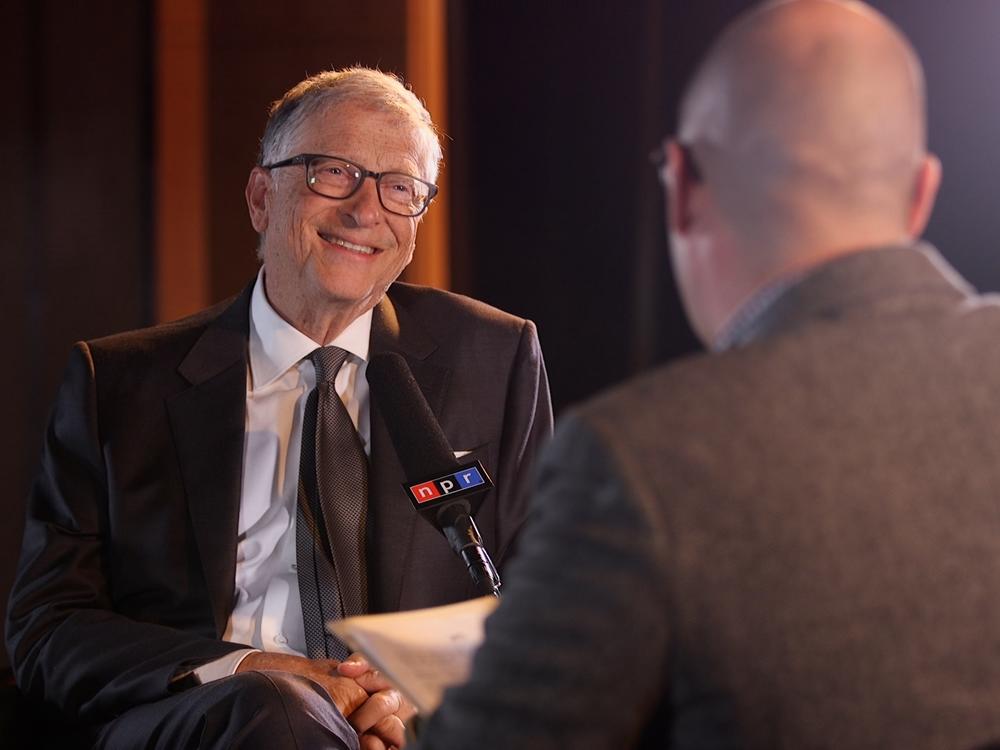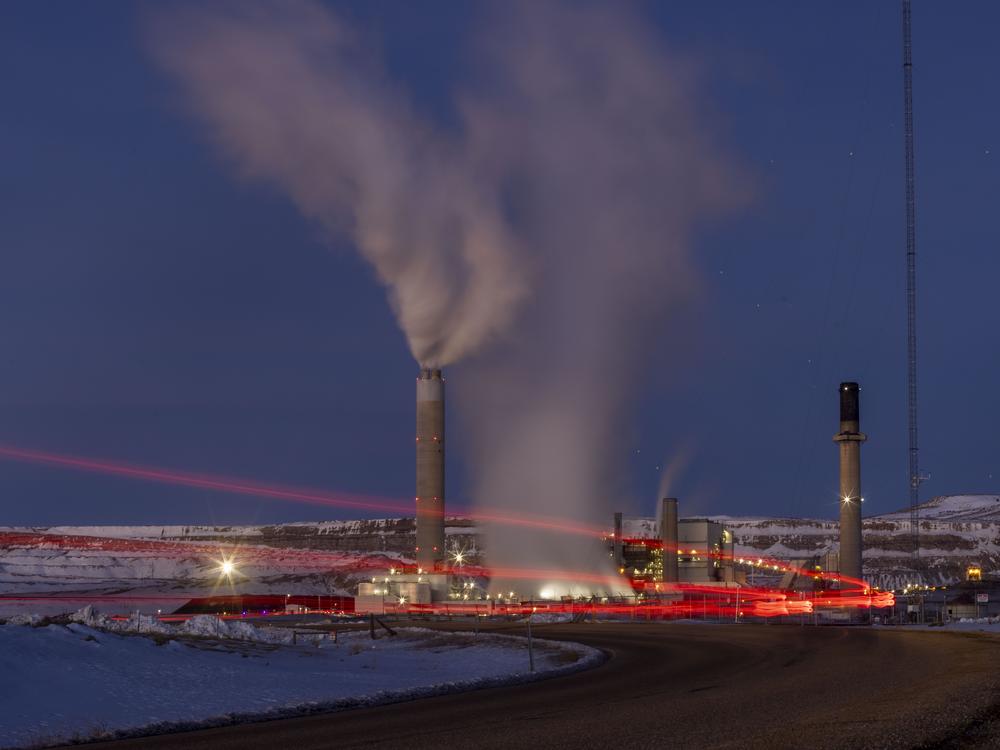Section Branding
Header Content
Bill Gates is going nuclear: How his latest project could power U.S. homes and AI
Primary Content
Artificial intelligence may come for our jobs one day, but before that happens, the data centers it relies on are going to need a lot of electricity.
So how do we power them and millions of U.S. homes and businesses without generating more climate-warming gases?
Microsoft founder, billionaire philanthropist and investor Bill Gates is betting that nuclear power is key to meeting that need — and he’s digging into his own pockets to try and make it happen.
Gates has invested $1 billion into a nuclear power plant that broke ground in Kemmerer, Wyo., this week. The new facility, designed by the Gates-founded TerraPower, will be smaller than traditional fission nuclear power plants and, in theory, safer because it will use sodium instead of water to cool the reactor’s core.
TerraPower estimates the plant could be built for up to $4 billion, which would be a bargain when compared to other nuclear projects recently completed in the U.S. Two nuclear reactors built from scratch in Georgia cost nearly $35 billion, the Associated Press reports.
Construction on the TerraPower plant is expected to be completed by 2030.
Gates sat for an interview at NPR headquarters with Morning Edition host Steve Inskeep to discuss his multibillion dollar nuclear power investment — and how he views the benefits and challenges of artificial intelligence, which the plant he’s backing may someday power.
This interview has been edited for length and clarity.
Steve Inskeep: Let me ask about a couple of groups that you need to persuade, and one of them is long-time skeptics of the safety of nuclear power, including environmental groups, people who will put pressure on some of the political leaders that you've been meeting here in Washington. Are you convinced you can make a case that will persuade them?
Bill Gates: Well, absolutely. The safety case for this design is incredibly strong just because of the passive mechanisms involved. People have been talking about it for 60 years, that this is the way these things should work.
Meaning if it breaks down, it just cools off.
Exactly.
Something doesn't have to actively happen to cool it.
There's no high pressure on the reactor. Nothing that's pushing to get out. Water, as it's heated up, creates high pressure. And we have no high pressure and no complex systems needed to guarantee the safety. The Nuclear Regulatory Commission is the best in the world, and they'll question us and challenge us. And, you know, that's fantastic. That's a lot of what the next six years are all about.
Let me ask about somebody else you need to persuade, and that is markets — showing them that this makes financial sense. Sam Altman, CEO of OpenAI, is promoting and investing in nuclear power and is connected with a company that put its stock on the market and it immediately fell. Other projects that started to seem too expensive have been canceled in recent years. Can you persuade the markets?
Well, the current reactors are too expensive. There are companies working on fission and there's companies working on fusion. Fusion is further out. I hope that succeeds. I hope that in the long run it is a huge competitor to this TerraPower nuclear fission. Unlike previous reactors, we're not asking the ratepayers in a particular geography to guarantee the costs. So this reactor, all of the costs of building this are with the private company, TerraPower, in which I'm the biggest investor. And for strategic reasons, the U.S. government is helping with the first-of-the-kind costs.
The U.S. Department of Energy is funding half the costs of TerraPower’s project, which includes the cost of designing and licensing the reactor, the AP reports.
I wonder if you can approach an ordinary investor and say, “This is a good risk. It's going to pay off in a reasonable time frame?”
You know, we're not choosing to take this company public, because understanding all of these issues are very complex. Many of our investors will be strategic investors who want to supply components, or they come from countries like Japan and Korea, where renewables are not as easy because of the geography. And so they want to go completely green. They, even more than the U.S., will need nuclear to do that.
What is the connection between AI and nuclear power?
Well, I suppose people want innovation to give us even cheaper electricity while making it clean. People who are optimistic about innovation in software and AI bring that optimism to the other things they do. There is a more direct connection, though, which is that the additional data centers that we'll be building look like they'll be as much as a 10% additional load for electricity. The U.S. hasn't needed much new electricity — but with the rise in a variety of things from electric cars and buses to electric heat pumps to heating homes, demand for electricity is going to go up a lot. And now these data centers are adding to that. So the big tech companies are out looking at how they can help facilitate more power, so that these data centers can serve the exploding AI demand.
I'm interested in whether you see artificial intelligence as something that potentially could exacerbate income inequality, something that you as a philanthropist would think about.
Well, I think the two domains that I'm most involved in seeing how AI can help are health and education. I was in Newark, New Jersey, recently seeing the Khan Academy AI called Khanmigo being used in math classes, and I was very impressed how the teachers were using it to look at the data, divide students up to have personalized tutoring at the level of a kid who's behind or a kid who's ahead.
Whenever I get, like, a medical bill or a medical diagnosis, I put it in the AI and get it to explain it to me. You know, it's incredible at that. And if we look at countries like in Africa where the shortage of doctors is even more dramatic than in the United States, the idea that we can get more medical advice to pregnant women or anybody suffering from malaria, I'm very excited. And so driving it forward appropriately in those two domains I see as completely beneficial.
Did you understand what I was asking, about the concentration of power?
Absolutely. This is a very, very competitive field. I mean, Google is doing great work. Meta. Amazon. And it's not like there's a limited amount of money for new startups in this area. I mean, Elon Musk just raised $6 billion. It's kind of like the internet was in the year 2000. The barriers to entry are very, very low, which means we're moving quickly.
And the other thing about a concentration of power … Do you worry about, you know, more money for investors and fewer jobs for ordinary people? Like they can get this wonderful AI technology, but they don’t have a job?
I do worry about that. Basically, if you increase productivity, that should give you more options. We don't let robots play baseball. We're just never going to be interested in that. If robots get really good, and AIs get really good, are we in some ways going to want, in terms of job creation, to put limits on that, or tax those things? I’ve raised that in the past. They're not good enough yet to be raising those issues. But you know, say in three to five years, they could be good enough.
But for now, your hope is the AI doesn't replace my job. It makes me more productive in the job that I already have.
Well, there are few jobs that will replace you just like computers did. In most things today, AI is a co-pilot, it raises your productivity. But if you're a support person, taking support calls and you're twice as productive, some companies will take that productivity and answer more calls and have more quality of answer. Some companies will need less people, now freeing up labor to do other things. Do they go and help reduce class size or help the handicapped or help with the elderly? If we're able to produce more, then the pie is bigger. But are we smart in terms of tax policies or how we distribute that, so we actually take freed-up labor and put into things we’d like to have?
The Bill & Melinda Gates Foundation is an NPR funder.
The audio version of this story was produced by Kaity Kline and edited by Reena Advani. The digital version was edited by Amina Khan.


